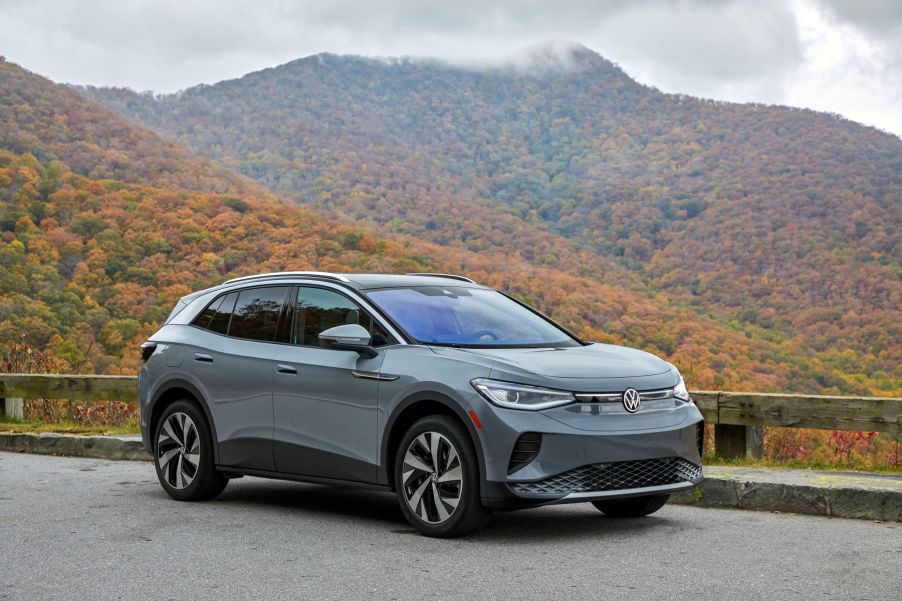
5 Reasons to Buy a 2022 Volkswagen ID.4, Not a Toyota bZ4X
Already approaching its third production year, the Volkswagen ID.4 has proven to be a consumer-friendly electric SUV with growing popularity in the U.S. and worldwide. Yet, how does the German car manufacturer’s first American-sold electric vehicle in its ID. lineup stack up against other new entrants in its market segment? Here are five reasons to buy the 2022 Volkswagen ID.4, not Toyota’s first attempt at an electric SUV, the 2023 Toyota bZ4X.
1. The Volkswagen ID.4 has a lower starting price

According to the manufacturer, the Volkswagen EV’s starting price is $41,230. Additionally, buyers of the 2022 VW ID.4 may be eligible for a $7,500 tax credit, effectively bringing the price down to just under $34,000.
On the other hand, Toyota’s electric SUV, the 2023 bZ4X, has a $42,000 starting price which is pretty reasonable and only a few hundred dollars more than the ID.4’s MSRP. It would be even more attractive to buyers if the Toyota EV were eligible for full federal tax credits.
However, according to The Drive, each manufacturer has a 200,000-car limit for how many electrified units sold are eligible for full tax credits. Given the bZ4X is Toyota’s first attempt at a BEV, the manufacturer hasn’t sold that many fully electric vehicles. However, it’s a different matter where hybrids are concerned. This means that if you’re interested in the Toyota electric SUV, you may have to pay close to full price.
2. You get a better standard warranty with the ID.4
In addition to paying a lower asking price, you may be subject to additional savings down the road due to a better standard warranty. Edmunds lists the warranty terms for the Volkswagen ID.4 as four years of basic coverage or 50,000 miles in addition to a similar guarantee for the drivetrain. Furthermore, there is the three-year/36,000 miles and seven-year/100,000 miles for roadside and rust cover protection, respectively.
For context, the Toyota bZ4X’s warranty terms include three years of basic coverage, a five-year warranty for rust, and two years of roadside assistance. Nevertheless, you would get a superior drivetrain cover that lasts five years or 60,000 miles.
3. The VW ID.4 offers more electric range
The Volkswagen ID.4 features an EPA-estimated 280 miles of range for the Pro trim. This puts it between the 2023 Polestar 2 with its 270-mile range and the 2022 BMW i4 eDrive40 rated for up to 301 miles. That said, going for the AWD Pro and higher trims comes with some range sacrifice. In fact, if you pick the AWD version of the Pro S trim, you’ll miss out on as much as 35 miles of range, according to Car and Driver.
As for the bZ4X, Toyota lists the electric range at 252 miles for the front-wheel-drive XLE trim. This figure goes down to 242 miles for the more expensive Limited trim and can even go as low as 222 miles depending on whether you opt for AWD.
4. You get more torque with the Volkswagen ID.4
Performance for the Volkswagen ID.4 and 2023 Toyota bZ4X is identical where horsepower for the base models is concerned, with motors in both vehicles producing 201 hp. That said, torque figures are different, with the Volkswagen coming out ahead at 229 lb-ft while the Toyota trails with 196 lb-ft of torque.
Additionally, the performance gap seems to widen with higher trims, where you see differences even in horsepower. The Limited trim with all-wheel drive, the bz4X’s most powerful option, pumps out 214 hp and 248 lb-ft torque. Conversely, the motors in its VW equivalent, the AWD Pro S, produce 295 hp and 339 lb-ft of torque.
5. With the VW ID.4, you can carry more cargo
Lastly, despite the Toyota bZ4X being longer and wider with only a 0.1-inch height difference in favor of the Volkswagen, the ID.4 still ends up with more interior room. This allows the EV to have more cargo capacity than its counterpart. Where the Toyota offers 27.7 cu. ft. of storage with all seats in place, the Volkswagen ID.4 has 30.3 cu. ft.
As for when the second-row seats in both vehicles are folded for extra storage, the Toyota ends up with 56.1 cu. ft. while the ID.4 provides 64.2 cu. ft. of cargo room. Consequently, the VW EV is the obvious choice if you plan on carrying a little more luggage on your road trips.


